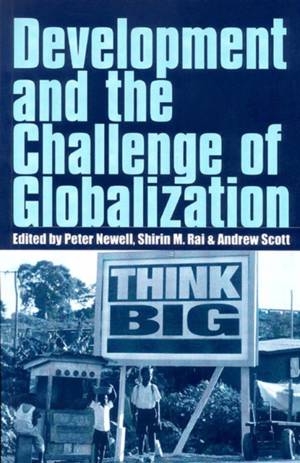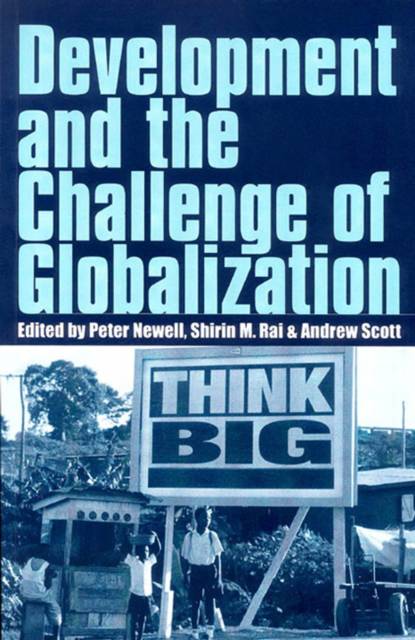
Door een staking bij bpost kan je online bestelling op dit moment iets langer onderweg zijn dan voorzien. Dringend iets nodig? Onze winkels ontvangen jou met open armen!
- Afhalen na 1 uur in een winkel met voorraad
- Gratis thuislevering in België vanaf € 30
- Ruim aanbod met 7 miljoen producten
Door een staking bij bpost kan je online bestelling op dit moment iets langer onderweg zijn dan voorzien. Dringend iets nodig? Onze winkels ontvangen jou met open armen!
- Afhalen na 1 uur in een winkel met voorraad
- Gratis thuislevering in België vanaf € 30
- Ruim aanbod met 7 miljoen producten
Zoeken
Development and the Challenge of Globalization
Peter Newell, Andrew Scott, Shirin Rai
Paperback | Engels
€ 33,45
+ 66 punten
Omschrijving
Understanding globalization is key for the future of development. Increasingly globalized patterns of economic exchange and political interaction shape the possibility of reforms to benefit the poor. There is an urgent need to assess what challenges this new context poses for development. In particular, what are the challenges to the objective of poverty reduction implied by globalization? The aim of this book is to take a critical look at the trends associated with globalization and assess what they mean for traditional practices of development. Going beyond attempts to quantify the pros and cons of globalization and the ideological tenor of much of the polemical debate, the approach is to focus on the actors, institutions and processes by which the relationship between globalization and poverty is mediated. This is important for understanding who the winners and losers from globalization are likely to be, given the current political and economic constraints under which practitioners operate. Such an approach helps to clarify the sense of the obstacles and opportunities that will shape any attempt to promote poverty elimination in a context of globalization. The book explores how the relationship between globalization and poverty is handled by institutions and actors that govern social and economic interactions at every level of society. The focus is on the consequences of globalization, the actors, institutions and movements that are operating in the new global political space, and on the strategies that are being developed to contest the impact of globalization on people's lives. The chapters examine three broad areas: production and exchange in the context of small scale producers; changing gender relations and feminist movements; and the environmental consequences of globalization and the movements that have emerged to challenge these. This reflects the editors' concern with the consequences of globalization as well as the politics of resistance to its negative outcomes.
Specificaties
Betrokkenen
- Auteur(s):
- Uitgeverij:
Inhoud
- Aantal bladzijden:
- 224
- Taal:
- Engels
Eigenschappen
- Productcode (EAN):
- 9781853394928
- Verschijningsdatum:
- 15/12/2002
- Uitvoering:
- Paperback
- Formaat:
- Trade paperback (VS)
- Afmetingen:
- 171 mm x 222 mm
- Gewicht:
- 381 g

Alleen bij Standaard Boekhandel
+ 66 punten op je klantenkaart van Standaard Boekhandel
Beoordelingen
We publiceren alleen reviews die voldoen aan de voorwaarden voor reviews. Bekijk onze voorwaarden voor reviews.











